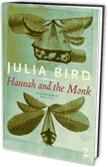
David Briggs on Hannah and the Monk by Julia Bird (Salt, 2008)
Julia Bird’s first collection excavates folk legend, urban myth, idiom and popular culture with sharp-edged tools. The book opens with an apologia for the urban myth that
“every breath you or I or anybody takes
contains a single molecule of air
expired with Caesar’s dying words”;
an argument that succeeds not by logic, but through charm, wit and the seductive power of precise language. Like Donne’s exaggerated claims for his flea, Bird’s wit and sensuality draw you into a world where “hoping it might be so” becomes “an article of faith”. A similar concern with the what-ifs and just-supposes of contemporary culture – the notion that the world’s population might fit on the Isle of Wight, coded messages over the tannoy in public spaces, and the strange power of the passport-photo booth – lead to playful explorations that avoid spinning off into whimsy, pegged down as they are by some weighty lines. The man with the clipboard who checks the world and his wife through Portsmouth docks sits, his face set toward the needles, while “the world hangs hollow at his back”. And when a jaded usherette reveals the theatre’s code for a fire, Bird visualises the scene in the dressing-room with startling clarity:
“… the lit ciggie set too close to the spirit gum
for the second act moustache.
Their dialogue. The two beat breath
and the sticky flame which treacles off the table
and into a wicker skip
of doublets, hose and tennis whites,
how it rhubarbs to itself a while then roars –
the heat so fast and loud it blows the light bulbs
round the mirror, one after the other,
a pyrotechnic chorus line of pop and shatter.”
Bird is equally intrigued by language and idiom as by urban myth, with several poems making use of a range of Englishes. A poem about hunger, ‘Monoglutton’, is spiced with idioms from French, Welsh, Hungarian, and British Sign Language. Two poems provide translations of Shakespeare’s Sonnet 116 and T S Eliot’s ‘Preludes 1’ using the vocabulary of the fridge magnet poetry kit:
“Let me not to the boy-girl-melt of good selfs
Say die.”
And, the final poem of the collection re-writes the picture book for modern babies using the soundscape of London:
“And what’s that sound from the underground?
It’s the tube trains calling ‘Minda GAP …
And what about this great-grandfather clock?
He’s chiming Heerizda NEWS
Bong Bong – Heerizda NEWS.”
The ludic irreverence continues in the games Bird plays with poetic form. A sequence of prose-poems provide a series of ‘Short Films’, the aforementioned poem about the passport-photo booth uses shape to evoke the required sense of claustrophobic framing; there are Lumsdenesque sevenlings, sonnets and a great deal of inventive ‘free verse’ throughout. Everywhere I turned I found form wedded to theme in a range of inventive ways that brought imagery to the foreground.
And Bird’s sharp eye creates some stunning images. I loved the bold assertion at the end of ‘Your Grandfather Would have Wanted You to Have This’, and the image of a Jim’ll Fix It devotee receiving from his idiosyncratic patron a chandelier that
“swung in the room all the wrong scale,
like ladies’ earrings on a little girl”
is a charming evocation of the bathos that characterised that particular show. The subjects are eclectic, but reading this book is to be charmed by a poetic imagination that transforms everything it touches. This is a witty and inventive book, its face set against the detritus of contemporary British culture.
* David Briggs' first collection The Method Men is forthcoming from Salt
